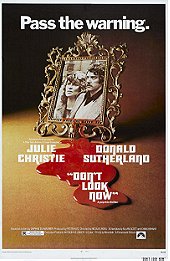When he was (finally) presented with his (overdue) Honorary Academy Award in 2017, Whoopi Goldberg specifically highlight Donald Sutherland’s enigmatic, gripping, haunted performance in Don’t Look Now as a primary example of his talents as an actor. She not displayed great taste in cherry picking this film as a standout of his exemplary career but underscoring just how humane and tangible his work in this film remains. Sutherland plays a man grappling with the death of a child, now genuflecting for an escape from the all-encompassing grief he and his wife are experiencing.
His wife (Julie Christie) indulges in the spiritual and supernatural world, frequenting a psychic and praying for visions of the future where the darkness is worked through. While he buries himself in here and now, indulges in memories of the past, and goes about restoring a dilapidating church. Don’t Look Now barely contains a present tense as the threads of the past, present, and future maneuver through and around each other throughout.
Grief is the major ghost haunting the characters and their actions. It lingers around the margins of the frame as a subliminal ache that never finds a fissure to seep through and explode the stasis they’ve built for themselves. It’s important that Sutherland’s grieving father is restoring a church as it is a blunt symbolic gesture. If you’re looking for faith and the balm of reason, many others have found it in a church. Not only are the performances marked by restraint, but so is the film as a whole only provides a few moments of release.
Are there really ghosts in Don’t Look Now? In a sense, yes, but they’re not the type typically found in your horror movies. These are ghosts of past traumas that will not be ignored or forgotten from the emotional spheres of these characters live any time soon. This is why Sutherland tries to hide from the blind clairvoyant and her sister only to laugh at the futility of his efforts and there wider comedic childishness. You cannot outrun or hide from your traumas, and they will manifest and haunt you until faced and worked through. All the game face carrying on will not heal these scars.
Look further at how the streets and canals of Venice become an Escher-like maze that taunts the couple at various points. A sense of place and location slowly evaporates until an uneasy displacement and confusing takes over. It’s like they’ve managed to physical their emotional state by getting lost in the city streets they’ve taken on as a temporary home. You’d think they’d know their way around, but something is amiss, and is that red-cloaked specter their dead daughter come back to haunt/taunt them?
Don’t Look Now generates a persistent feeling of claustrophobia and unease that turns its domestic drama into the stuff of horror and nightmares. This couple still cares deeply for each other, and there’s a maturity to the treatment of their relationship and their struggle for a return to normalcy that only aides the continuous wait for the bottom to drop out. It would probably be easier to digest Don’t Look Now if the daughter’s ghost that’s come between them caused the couple to lash out against each other, but no such luck. The truth of the daughter’s ghost is besides the point. Domestic bliss and comfortable normalcy will never return no matter how much they valiantly try for it.
 Login
Login